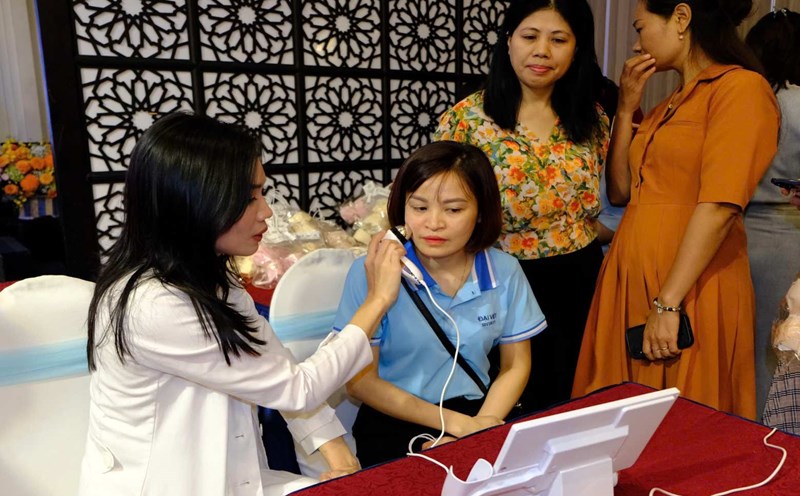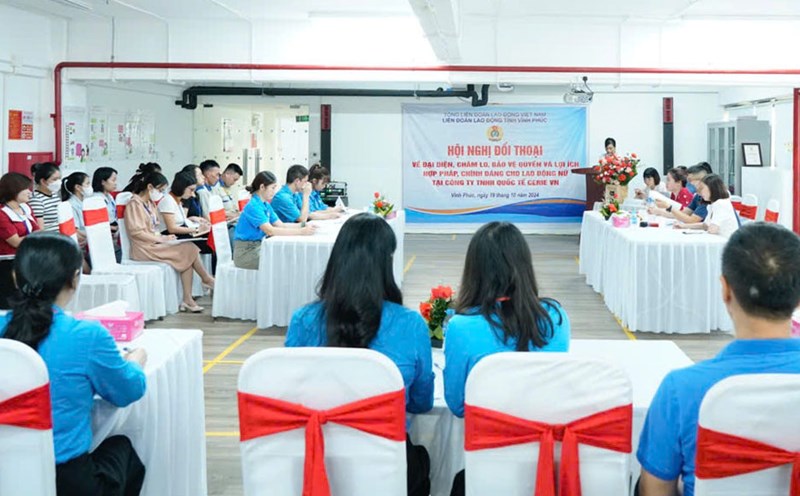Take time off to look after children
At the seminar “Labor and employment needs, some basic rights and policies to support female workers” held on the morning of October 27, Ms. Mai Thi Vi (36 years old, from Bac Kan) said that she has been working in Hai Phong for more than 10 years. At first, Ms. Vi worked as a worker in an industrial park with an average income of about 10 million VND/month. However, for more than a year now, Ms. Vi has quit her job to find seasonal work. The biggest obstacle for Ms. Vi in finding a stable job is her family.
“My children are still young and my husband works far away, so I do seasonal work in VSIP Industrial Park with an income of 320,000-350,000 VND/day. The job is unstable, the income is low, I don’t pay social insurance or receive allowances, but I still have to accept it to have time to take care of my family and children,” said Ms. Vi.
Previously, according to Mr. Vu Dinh Phi - Chairman of the Trade Union of Regina Miracle International Co., Ltd. (VSIP Industrial Park), the Company has more than 30,000 employees, of which 65% are female employees, mainly of childbearing age, raising young children.
Many female workers after maternity leave have to take their children back to their hometown for their grandparents to look after or take their grandparents to Hai Phong to look after their children. Many people quit their jobs after maternity leave to stay home and look after their children.
According to Ms. Pham Thu Thuong - Deputy Head of the Propaganda Department of Women's Union of Hai Phong City, a recent survey shows that women spend nearly 5 times more time on family than men, while the time spent on production labor of both is the same. This is also one of the reasons why female workers have difficulty balancing their time to maintain stable employment as well as take care of themselves.
More policies and regimes to support female workers
According to statistics from the Hai Phong City Labor Federation, female workers account for 70% of the total number of workers in industrial parks, most of whom are from other provinces, of pregnant age, and have young children.
To support female workers, enterprises in Hai Phong have many preferential policies and regimes. Of which, 195/347 enterprises have policies to support female workers raising young children from 50,000 - 100,000 VND/month/child, the number of supported workers is about more than 22,000 people. Pregnant female workers and those raising young children are also arranged light and suitable jobs, have rooms for milk collection and storage, rooms for resting between shifts, and resting during menstruation...
In addition to care policies, the city's Trade Union at all levels focuses on propaganda to raise awareness, understanding of the law as well as knowledge of health care, especially reproductive health for female workers.
In the first 9 months of 2024 alone, 248 units organized propaganda on reproductive health care, female labor policies, domestic violence prevention... for 86,626 female workers with a total cost of over 6.5 billion VND...
Along with the policies that have been and are being applied, the representative of the Propaganda Department of the Women's Union of Hai Phong City Labor Federation said that the Hai Phong City Labor Federation proposed that the Vietnam General Confederation of Labor and the Hai Phong City People's Committee unify investment in trade union cultural institutions to ensure social security for female workers raising young children, and support children of workers from other provinces when they reach school age. In particular, special attention should be paid to building kindergartens near industrial parks to solve the difficulty in finding childcare for workers from other provinces, helping workers have the opportunity to access stable jobs with good income instead of having to quit their jobs or do informal jobs with unstable income.
The Hai Phong City Labor Federation also directed all levels of trade unions, especially grassroots trade unions, to coordinate with businesses to have many preferential policies in employment as well as related benefits to attract female workers, helping workers feel secure in their work and stay with the business for a long time.















